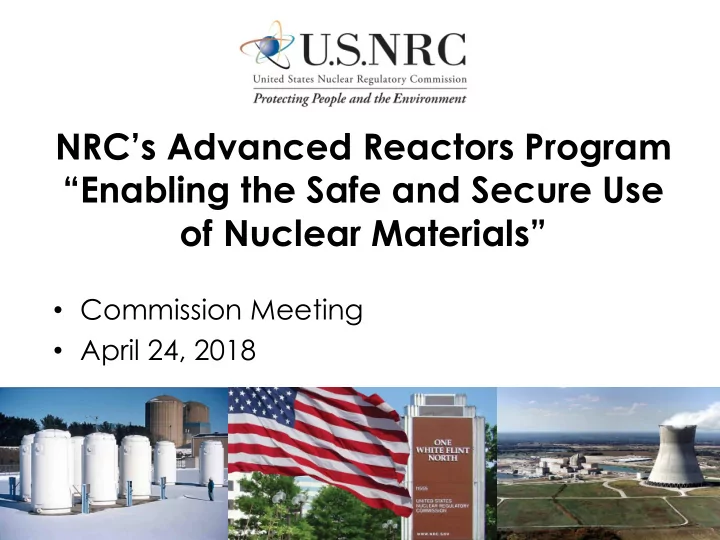

NRC’s Advanced Reactors Program “Enabling the Safe and Secure Use of Nuclear Materials” • Commission Meeting • April 24, 2018
Agenda • NRC’s Advanced Reactors Program – Fred Brown • Licensing Readiness and Potential Policy Issues – John Monninger • Analytical Codes, Tools, and Industrial Standards – Stephen Bajorek • Fuel Cycle Considerations – Brian Smith 2
NRC’s Advanced Reactors Program Fred Brown, Acting Director Office of New Reactors 3
Dynamic and Evolving Landscape LMFR HTGR MSR Framatome GE-H Kairos X-energy ARC StarCore Oklo TerraPower TRISO Fuel Terrestrial Sodium Transatomic Cooled Westinghouse Thorcon Columbia Basin Flibe Hydromine Thermal Neutron Spectrum Lead TerraPower General Atomics Cooled Fast Neutron Spectrum Elysium R RIS Responses Liquid Fuel 4
Assuring Readiness • Developed the Vision and Strategy • Executing the Implementation Action Plans • Building capabilities – Incremental progress – Identifying key policy issues – Focused “Core” team concept 5
Potential Early Applications • Individual developer’s timelines • Recognizing relative maturity • Further transformation – Leveraging advancements from recent light water reactors licensing – Optimizing the regulatory structure 6
Licensing Readiness and Potential Policy Issues John Monninger, Director Division of Safety Systems, Risk Assessment, and Advanced Reactors Office of New Reactors 7
Making Progress in the Near-Term 8
Modernizing the Licensing Approach • Flexible, staged, and predictable processes • Advanced Reactors Design Criteria • Developing a risk-informed, and performance-based approach – Identification of licensing-basis events – Probabilistic risk assessment approach – Classification of structures, systems, and components – Defense-in-depth 9
Pursuing Resolution of Policy Issues • Emergency preparedness for small modular reactors and other nuclear technologies • Consequence based physical security • Functional containment performance criteria 10
Evaluating Other Potential Issues • Engaging with stakeholders to identify and prioritize potential policy issues – Siting – Insurance • Technology-specific policy issues 11
Analytical Codes, Tools, and Industrial Standards Stephen M. Bajorek, Ph.D. Senior Level Advisor for Thermal Hydraulics Division of Systems Analysis Office of Nuclear Regulatory Research 12
Progress in Technical Readiness • Familiarization with advanced reactor technologies and technical issues • Access and training with DOE analysis codes and evaluation of existing NRC code capabilities • Identification of technical “gaps” – Code capabilities and limitations – Experimental data and code verification and validation – Industrial standards for materials 13
Methodical Approach to Selection of Codes • Does a code contain the correct physics and modeling features? • Is it more economical to develop an NRC code, or adopt use of a code developed elsewhere? • If a non-NRC code is used, how does the NRC maintain its independence? • Can a code be developed for application to more than one reactor design type? • What applicable verification and validation exists for a particular code? 14
Comprehensive Reactor Analysis Bundle (CRAB) RATTLESNAKE SCALE Neutronics Cross-sections Nek5000 CFD PRONGHORN Core T/H PARCS AGREE FLUENT Neutronics Core T/H CFD TRACE MOOSE System T/H BISON MELCOR Fuel Performance Containment / FP FAST SAM Fuel Performance System and Core T/H NRC Code DOE Code Commercial 15
Resolving Technical Challenges • Numerous advanced reactor designs • Some (vital) data is non-existent – Molten salt thermophysical properties – High temperature material behavior • DOE and NRC codes have been developed for different purposes – DOE: Normal operation, very high detail – NRC: Accident scenarios, peak power regions • DOE codes designed for high performance computing systems 16
Leveraging Industrial Standards • NRC Objectives – Obtain performance needs and identify issues for structural materials and component integrity – Support consensus standards • Staff participation on Industrial Standards activities – ASME Section III, Division 5 – High Temperature Materials – ANS Committees and Working Groups – ASME/ANS Joint Committee on Nuclear Risk Management 17
Path Forward • Efforts in 2018 will be primarily generic and focus on identification of gaps in knowledge, data, and code modeling requirements • DOE codes will continue to be tested and cooperative efforts expanded • Support for Industrial Standards activities will continue with emphasis on high temperature materials 18
Fuel Cycle Considerations Brian Smith, Deputy Director Division of Fuel Cycle Safety, Safeguards, and Environmental Review Office of Nuclear Material Safety and Safeguards 19
Engagement on Fuel Cycle Considerations • Participant in meetings with developers, industry, and DOE • Participant in advanced reactors training • Reviewed draft NEI white paper on challenges for front end fuel cycle 20
Evaluation of Fuel Cycle Regulatory Framework • Existing framework has sufficient flexibility for solid-fueled reactors using once through fuel cycle – May require new regulatory guidance for new design characteristics • Potential for regulatory challenges for fluid-fueled reactors or reactors with closed fuel cycles 21
Engaging on Issues that Need to be Addressed by Industry • Obtaining uranium enriched greater than 5% and subsequent fuel fabrication • New transportation packages • Criticality benchmark experiments 22
Proactively Identifying Regulatory Issues • Material control and accounting requirements for Category II facilities • Physical security requirements for Category II facilities • Material control and accounting requirements for fluid-fueled reactors 23
Continue Active Participation • Maintain involvement in advanced reactors activities • Encourage industry development of fuel cycle technology and designs in parallel with reactors design • Encourage industry development and implementation of regulatory engagement plan 24
Acronyms ANS – American Nuclear Society • ASME – American Society of Mechanical Engineers • BPVC – Boiler and pressure vessel code • DOE – Department of Energy • EP – Emergency preparedness • GAIN – Gateway for Accelerated Innovation in Nuclear • HTGR – High temperature gas reactor • LBE – Licensing basis events • LMFR – Liquid metal fast reactor • MOU – Memorandum of Understanding • MSR – Molten salt reactor • NEI – Nuclear Energy Institute • Non-LWR – Non light-water-reactor • ONT – Other nuclear technologies • ORNL – Oak Ridge National Laboratory • PRA – Probabilistic Risk Assessment • RIS – NRC Regulatory Information Summary • SMR – Small modular reactor • SSC – Structures, systems, and components • 25 25
Recommend
More recommend